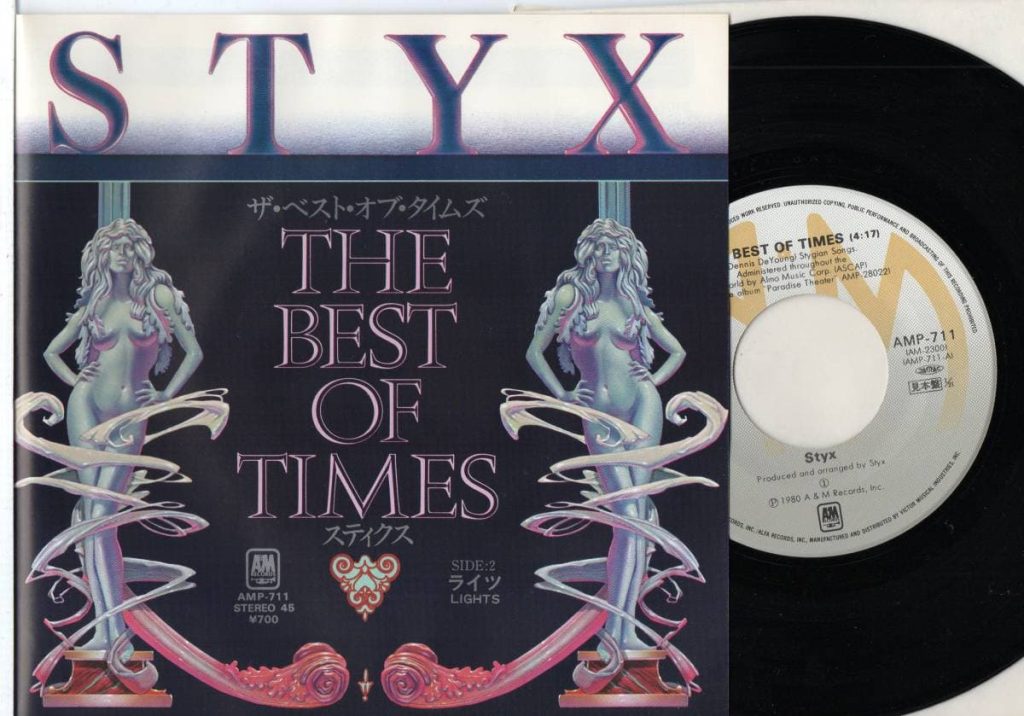
“The Best of Times” – Styx’s Nostalgic Anthem for Resilience and Hope
Released in 1981 as part of Styx’s concept album Paradise Theatre, “The Best of Times” captures both the optimism and uncertainty of its era. Written by Dennis DeYoung, the song served as the album’s lead single and reached No. 3 on the Billboard Hot 100. It became one of Styx’s signature songs, resonating with fans as a message of finding hope during difficult times. “The Best of Times” became the centerpiece of Paradise Theatre, an album symbolizing the cyclical rise and fall of the American dream, and the song itself embodies themes of resilience, love, and the enduring value of shared experiences.
The song opens with DeYoung’s soft piano melody and poignant lyrics, “Tonight’s the night we’ll make history, honey, you and I.” DeYoung’s heartfelt vocal delivery immediately draws listeners in, setting a reflective, sentimental tone. As the music swells, the band layers on guitar and drums, gradually building to an anthemic chorus that captures the sense of togetherness and strength in facing life’s uncertainties. DeYoung’s voice, combined with the backing harmonies, creates a feeling of unity and nostalgia that’s both comforting and uplifting.
Lyrically, “The Best of Times” centers on the idea that, despite life’s challenges, love and cherished memories create a foundation of hope. The chorus, “These are the best of times / But the worst of times,” is a nod to the dual nature of life, especially in moments of social or personal upheaval. Written in a period marked by economic struggles and social change, the song’s lyrics encourage listeners to find solace and strength in their connections with loved ones. The words convey a timeless message, one that has continued to resonate with fans across generations.
The instrumentation is quintessentially Styx, blending classic rock with progressive elements that emphasize the song’s themes. Tommy Shaw’s guitar work adds a bright, soaring quality that complements DeYoung’s vocals, while the rhythm section creates a steady, grounded feel. Styx’s trademark style—rock with symphonic elements—shines in the song’s structure, with each instrument adding layers of texture and depth. The dramatic, almost theatrical bridge and the song’s climactic guitar solo reflect Styx’s signature fusion of rock and classical influences, elevating the track into a powerful ballad.
“The Best of Times” became a defining song for Styx, solidifying their reputation as a band capable of blending progressive rock with universal themes of love, resilience, and nostalgia. The song played a significant role in Paradise Theatre’s success, helping the album reach No. 1 on the Billboard 200 and achieving triple platinum status. The song’s appeal lies in its combination of heartfelt lyrics and anthemic sound, which struck a chord with listeners during a time of change and remains impactful to this day.
In the years since its release, “The Best of Times” has become a staple of Styx’s live performances and a fan favorite. Its timeless message reminds audiences of the strength found in memories and relationships, providing a sense of solace and optimism. Through its nostalgic lyrics and soaring melodies, “The Best of Times” endures as a powerful anthem, encouraging listeners to cherish the present while holding hope for the future.